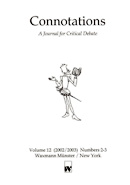Articles in this issue
- Shakespeare's Falstaff as Parody
Arthur F. Kinney, and [else], Vol. 12: 105-25
- Parody, Satire and Sympathy in Don Quixote and Gulliver's Travels
David Fishelov, and [else], Vol. 12: 126-38
- Parody as Cultural Memory in Richard Powers's Galatea 2.2
Anca Rosu, and [else], Vol. 12: 139-54
- "The most important subject that can possibly be": A Reply to E. A. J. Honigmann
Hildegard Hammerschmidt-Hummel, and [else], Vol. 12: 155-66
- "Grace beyond a curled lock": Further Thoughts on Henry Vaughan's "Isaac's Marriage"
Glyn Pursglove, and [else], Vol. 12: 167-82
- Unsexing Austen: A Response to Leona Toker
Amanpal Garcha, and [else], Vol. 12: 183-93
- Wuthering Heights and The Secret Garden: A Response to Susan E. James
Anna Krugovoy Silver, and [else], Vol. 12: 194-201
- The Making of a Goddess: Hardy, Lawrence and Persephone
Andrew Radford, and [else], Vol. 12: 202-32
- Dracula and the Cultural Construction of Europe
Jason Dittmer, and [else], Vol. 12: 233-48
- From Lone Monkey to Family Man: Wittman's Evolving Inclusion in Tripmaster Monkey
Lara Narcisi, and [else], Vol. 12: 249-80
- "It's wanting to know that makes us matter": Scepticism or Affirmation in Tom Stoppard's Arcadia. A Response to Burkhard Niederhoff
Anja Müller-Muth, and [else], Vol. 12: 281-91
- (Un)tying a Firm Knot of Ideas: Reading Yang Mu's The Skeptic
Lisa Wong, and [else], Vol. 12: 292-306
[/pod_if_field__1]
